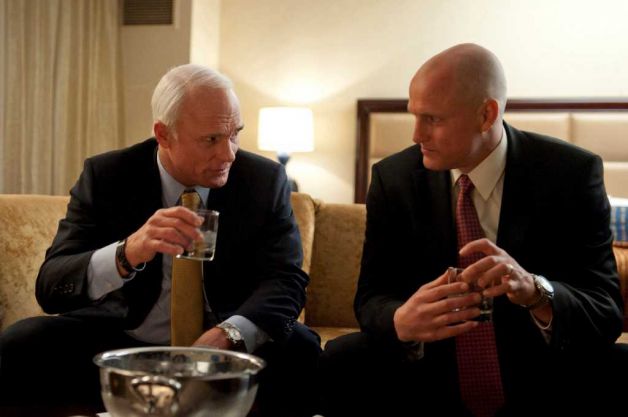Sarah Palin would be lucky if everyone portrayed her as generously as Julianne Moore does in "Game Change."
The United States is filling up with people who wholeheartedly embrace one political party and reject everyone in the other. They don't just reject the other party's platform — if they even know what it is. They just reject other people because they have an R or a D next to their names. They are dumb and tiresome.
 Also read: Sarah Palin: Limbaugh Criticism Are 'Definition of Hypocrisy'
Also read: Sarah Palin: Limbaugh Criticism Are 'Definition of Hypocrisy'
Palin's most ardent supporters would like you to believe that the creators of HBO's "Game Change" are these kinds of people — or worse, that they are liberal Hollywood elites out to shamelessly stoke the passions of knee-jerk Democrats and brainwash the uninformed.
They aren't. (Well, except for the liberal Hollywood elites part.) "Game Change," premiering Saturday, is a surprisingly balanced and relentlessly fair portrayal of Sarah Palin's 2008 vice presidential run. It is proof that people of one side can have empathy for those on the other, even as they critique them.
This makes "Game Change" in some ways a more informative and useful presentation than news coverage that treats politics as a game, with two equal teams, never to be fundamentally changed.
The film doesn't seem to care about playing gotcha. It seems genuinely interested in understanding a character the filmmakers must have truly struggled to understand. Almost all of them, from director Jay Roach to executive producer Tom Hanks, to the lead actors, including Moore, Woody Harrelson and Ed Harris, have proudly supported Democrats in the past.

The filmmakers' admitted liberal leanings will make anything they say, including the truth, suspect to their loudest conservative critics. (2008 presidential candidate John McCain and Palin are among those who have rejected the film.) But the "Game Change" creators seem to have swallowed the most damning things they could have said about Palin and McCain.
The film even skips some of the more personal and incendiary charges included in its source material, the book of the same name by reporters John Heilemann and Mark Halperin. No mention is made, for example, of the whispers and intimations that both McCain and his wife had affairs. The film could have sought tawdry drama by reviving such innuendo. It doesn't.
Also read: Sarah Palin Calls Rush Limbaugh Criticisms 'the Definition of Hypocracy'
Instead, it makes a simple case that is also demonstrably true: Sarah Palin had huge gaps in her foreign policy knowledge when she was elevated from Alaska governor to vice presidential candidate. Her selection was rushed and so was her background check. You don't need a liberal hatchet job to come to these conclusions. Just watch her interviews from 2008.
No, she never said, "I can see Russia from my house," any more than Al Gore said, "I invented the Internet." The misquotations caught on because they played into existing narratives.
But she did say a great many other dumb things, and made glaring mistakes. "Game Change," the book and the movie, indicate that she thought the queen was the acting head of England's government.

Palin was ignorant about foreign affairs. Some people will add on that she was megalomaniacal, psychotic and all sorts of other impressive words that no one can prove are accurate. So let's stick with the one we can readily verify. The reporters behind "Game Change" — and the creators of the HBO film — make the case repeatedly and convincingly, without any sense of glee.
Palin pressed on confidently in the race, despite her foreign policy ignorance, because she believed her selection was "God's plan," as she's quoted saying in the book and the film. Some people will call this humility, others, again, megalomania. Moore, who plays Palin with more respect and less gotcha than critics will ever admit, delivers the line as if Palin truly believes it.
Decisions like this one — to state the facts and spin them as little as possible — protect "Game Change" from most-based criticisms.
And so its critics are forced to invoke change-the-subject arguments, as Palin recently did when asked about Rush Limbaugh calling a woman a "slut" because they had different opinions about, essentially, what should be covered by private insurance. Rather than join him in saying his remarks were uncalled for, she argued that "leftist radicals" say horrible things and get away with it. As if that cancels out Limbaugh's foul.
The refusal of the "Game Change" producers to get in the mud — to bring out the really harsh, but less provable and more distasteful allegations — would, in a smarter and better world, make their film the subject of an open-minded discussion by people who want what's best overall, not just for those who have the same letters by their names that they do.
In a smarter and better world, people would give the film credit for giving Palin credit for the things she has done that have been indisputably good. Like her or not on specific policies, she has undeniably given hope and inspiration to many parents of special-needs children, for example.
One of the film's most effective moments — as art and as information — comes when we see Moore-as-Palin make an immediate connection with a special needs girl also named Sarah. Palin's biggest critics would benefit most from watching the scene, which shows her at her most appealing. Whether they want to understand her or just understand how to defeat her in future elections, the scene goes a long way to explaining her popularity.
Depressingly, the rigorous fairness of "Game Change" will cost it fans on both sides. Knee-jerk conservatives will refuse to consider that liberals might have any valid critiques of their hero. Knee-jerk liberals will wonder why the filmmakers didn't take every possible cheap shot.
It's easier to be completely one-sided than it is to be nuanced. Those who are hard to pin down are at once less hateable and less lovable. Oversimplification sells. The Rush Limbaughs and Sarah Palins and Keith Olbermanns and Michael Moores of the world benefit from it.
And that's too bad for those who might have something to offer both sides. The people who suffer most in our divided system are those like Palin's ostensible boss in 2008, McCain, who throughout his career was notoriously difficult to pin down ideologically. Barack Obama succeeded in large part by masterfully linking him to the unpopular George W. Bush, for whom McCain once felt a deep antipathy thanks to Bush's dishonest and race-baiting campaigning in South Carolina in 2000.
As sympathetically played by Ed Harris, McCain comes off as an at-least decent man whose great mistake was giving into the stupidity of our election cycles by choosing an unproven "star" rather than a more qualified veep prospect. Which feels pretty accurate.
But looking at the number of people who believe Obama is a Muslim from Kenya — or that Palin's child is really her grandchild, or that McCain had a black love child instead of a Bangladeshi adopted daughter, or that "Game Change" is mere propaganda — can you blame McCain for thinking so little of we, the voters?
"Game Change" premieres on HBO at 9/8c Saturday.
